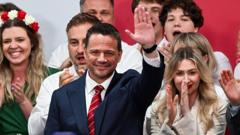As South Korea gears up for its presidential election, the leading candidate, Lee Jae-myung, aims to repair strained relationships with North Korea and China, contrasting sharply with the confrontational policies of former President Yoon Suk Yeol.
South Korea's Presidential Race: A Shift Towards Diplomacy with North Korea and China

South Korea's Presidential Race: A Shift Towards Diplomacy with North Korea and China
The upcoming election could redefine South Korea's foreign policy, moving away from confrontation under the previous administration.
South Korea is bracing for a significant shift in foreign policy ahead of its presidential election on June 3, 2025. The front-runner, Lee Jae-myung, has signaled a commitment to diplomacy that aims to mend the increasingly fraught ties with both North Korea and China. This change comes in the wake of former President Yoon Suk Yeol's administration, which took a markedly confrontational stance toward North Korea and diminished relations with China.
Under Yoon, South Korea's approach to the North became more aggressive, dismissing dialogue and promoting the flow of external information into the secluded state. This led North Korea to redefine its stance, abandoning the long-standing policy promoting reunification in favor of viewing South Korea as an adversary. Moreover, Yoon's administration complicated the already delicate balance in international relations, as it openly aligned with the U.S. against China, further straining ties.
Polls suggest that Lee, who has publicly criticized Yoon's policies, is likely to win the election. He emphasized the need for stabilization in relations with China, reflecting a broader call for renewed diplomacy rather than provocation. His rival, Kim Moon-soo, shares some of the same foreign policy ideals, suggesting continuity in certain areas while also promising to navigate the complexities of U.S.-China relations.
As South Korea stands at this crossroads, the election's outcome may not only redefine its internal political dynamics but also reshape its role on the global stage, particularly regarding engagement with its closest neighbors. The implications of this shift could resonate far beyond South Korea, influencing regional stability and international diplomacy in East Asia.
Under Yoon, South Korea's approach to the North became more aggressive, dismissing dialogue and promoting the flow of external information into the secluded state. This led North Korea to redefine its stance, abandoning the long-standing policy promoting reunification in favor of viewing South Korea as an adversary. Moreover, Yoon's administration complicated the already delicate balance in international relations, as it openly aligned with the U.S. against China, further straining ties.
Polls suggest that Lee, who has publicly criticized Yoon's policies, is likely to win the election. He emphasized the need for stabilization in relations with China, reflecting a broader call for renewed diplomacy rather than provocation. His rival, Kim Moon-soo, shares some of the same foreign policy ideals, suggesting continuity in certain areas while also promising to navigate the complexities of U.S.-China relations.
As South Korea stands at this crossroads, the election's outcome may not only redefine its internal political dynamics but also reshape its role on the global stage, particularly regarding engagement with its closest neighbors. The implications of this shift could resonate far beyond South Korea, influencing regional stability and international diplomacy in East Asia.





















